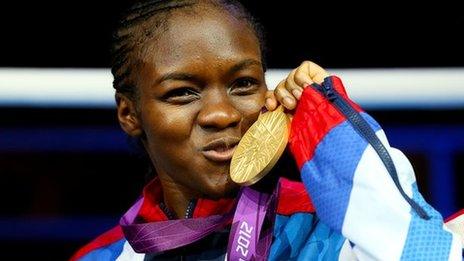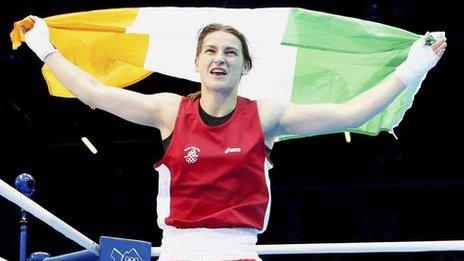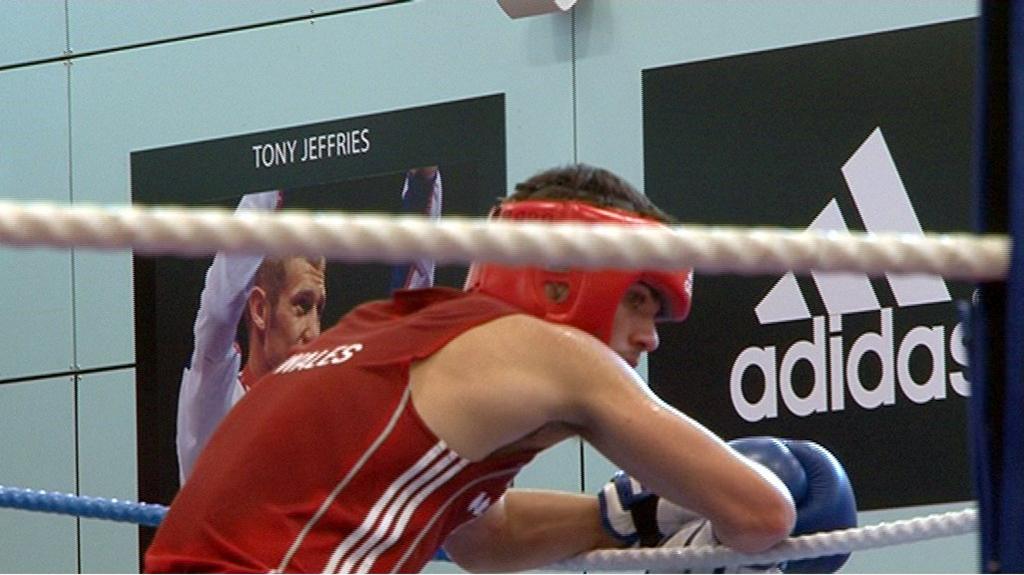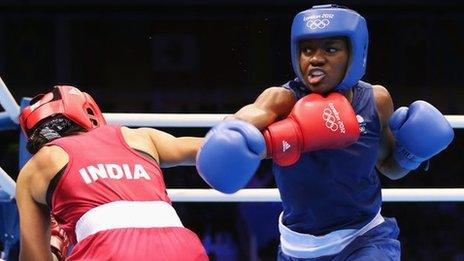Nicola Adams blasts through Olympic boxing's gender barrier
- Published
Watch as Nicola Adams wins historic boxing gold at London 2012
While Nicola Adams was dancing like Sugar Ray into the history books, a tiny, silver-haired old lady was perched ringside, watching her every move like a hawk.
Nicola Adams receives first women's boxing gold
Adams may not know Barbara Buttrick, but her historic feat was built on the foundations laid by this pioneer of women's boxing, back in the sepia age.
If Adams, who became the first female to win a gold medal in Olympic boxing by beating Chinese great Ren Cancan on Thursday, has encountered suspicion on the path to glory, Buttrick was assailed with outright hostility from all sides.
"What a monstrous, degrading, disgusting idea!" wrote former BBC boxing commentator Peter Wilson in 1948, on learning of Buttrick's "grotesque" ambitions.
"Would anyone like to go out with a girl sporting two lovely purplish black eyes? Would any sportsman, or sportswoman, relish the sight of tears, after a stiff punch on the nose, mingling with mascara?"
Now 82, Buttrick - bejewelled with little boxing-glove earrings and an International Boxing Hall of Fame ring - beams with understandable pride as she scans her scrapbook, at the torrent of weasel words that were slung her way. Victory for fellow Yorkie Adams might be considered ultimate revenge. Served cold, but better late than never.
"The quality of their boxing is just as good as the men," says Buttrick, a resident of Miami since the 1950s who used to train in the same gym as a certain Muhammad Ali - the legendary 5th Street. "I think it's so exciting. When I was around, fighting at the Olympics wasn't even a dream.
"The British Boxing Board of Control would not give me permission to fight and there was no chance of being on a regular licensed boxing show in England. Even in the States, the girls that boxed were doing it on little professional shows, the amateur gyms didn't admit girls until quite a few years later."
While Buttrick fought most of her bouts in fairground booths - "roll up, roll up, who dares to challenge The Mighty Atom?" - Adams is a product of a more enlightened age. Boxing internationally since 2001, she has been supported to the hilt. By her family, by her trainers, by her gym-mates, by the government.
Which is perhaps why she does not quite understand - yet - the scale of her achievement. When great breakthroughs are made they often seem mundane to those that achieve them. It is only when they take the time to look over their shoulders, at the scuppered dreams and shredded ambitions that lie in their wake, that the momentous nature really hits home.
"It hasn't really sunk in yet," said Adams, her gold medal, the size of the Top Rank gong, dangling round her neck. "Maybe once everything settles down, when I'm in bed tonight, I'll be like 'wow, I've actually done it'.
"But I just like being the normal Nikki Adams - walking the dog, doing day-to-day things. It's probably going to change now but I'm going to try to stay like that. I'll probably go to Nando's to celebrate. A few drinks? Why not?"
What an antidote to the often absurd world of professional boxing: a polite, bubbly Yorkshirewoman with gravel in her guts who never stops smiling. Some things have not changed since Buttrick's day.
Adams inspired by British support
Then there is Katie Taylor, the quietly-spoken Irish phenomenon from Bray, County Wicklow. It is hard to measure exactly how much her fight against Liverpool's Natasha Jonas did for women's boxing, but we will find out for sure one day when future Olympic champions are asked: "Why did you take up boxing?"
"Because I saw that fight between Taylor and Jonas at the London Games."
Whenever the four-time world and now Olympic lightweight champion fights, she stops a nation: what Usain Bolt does to Jamaica, Taylor does to Ireland. And the support she had at the ExCeL was frightening.
Taylor wears her adulation as lightly as a silk gown, not that she'll be parading around in one soon. Professional offers will flood in but, unlike in Buttrick's day, Taylor is such a star in the amateurs, it makes little sense to move.
"I just wanted everyone to see how great women's boxing is," said the 26-year-old. "But this is only the start. It will be amazing to see what the sport is like in a few years' time. I reckon in Rio in 2016 it will be even better than this."
For Buttrick, who was beaten only once in her illustrious career - "she was the one bleeding at the end of it, not me…" - nothing can trump London. Indeed, she seems so energised, I'm worried she might come out of retirement.
"If I was in Katie Taylor's weight class, I would have given her a good fight, I can tell you," says Buttrick. "I was always giving everything away in height and weight, but I could punch hard for my size."
Don't Adams and Taylor know it, Barbara - they just walked right through the hole you made.
- Published5 December 2012

- Published9 August 2012

- Attribution
- Published24 July 2012

- Published8 August 2012
